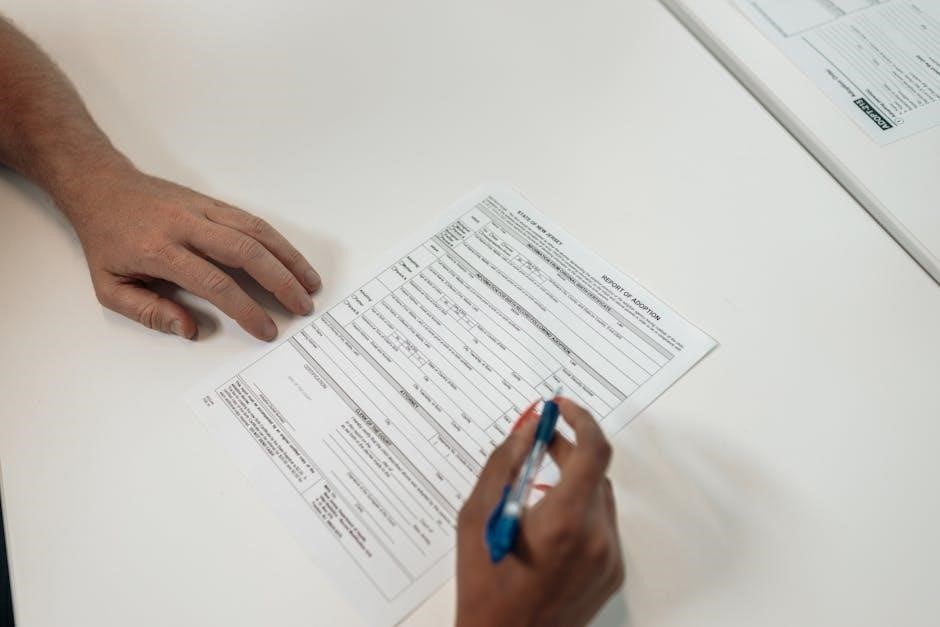The Free Tenant Application Form BC is a standardized template used by landlords to assess potential tenants, ensuring a fair and efficient rental process with all necessary details included.
1.1 Purpose of the Tenant Application Form
The purpose of the Tenant Application Form is to provide landlords with essential information to evaluate potential tenants fairly and efficiently. It collects personal, rental, and financial details to assess suitability for a property. This standardized document ensures landlords can make informed decisions while maintaining compliance with legal requirements; By gathering comprehensive data, it helps landlords avoid potential risks and ensures a smooth rental process for both parties. The form is designed to protect both tenant and landlord interests, promoting transparency and accountability in the rental relationship.
1.2 Importance of Using a Standardized Template
Using a standardized tenant application form ensures consistency and fairness in the rental process. It guarantees that all necessary information is collected, reducing the risk of missing critical details. A standardized template also helps landlords comply with legal requirements, avoiding potential disputes. By presenting a professional and uniform document, landlords demonstrate transparency and fairness to all applicants. This approach streamlines the evaluation process, making it easier to compare candidates objectively. Ultimately, it protects both parties by ensuring all aspects of the tenancy are clearly understood and agreed upon from the start.

Key Information Required in the Tenant Application Form
The form collects personal details, rental history, employment info, financial data, and references to help landlords assess potential tenants thoroughly and make informed decisions.
2.1 Personal Information
The tenant application form requires basic personal details, including the applicant’s full name, date of birth, and contact information. A valid government-issued ID may also be requested to verify identity. Social insurance numbers are sometimes included for credit checks, ensuring landlords can assess financial stability. Emergency contact details are often required for security purposes. Accurate and truthful disclosure of personal information is essential to avoid potential disputes or application rejection. This section helps landlords establish a foundational understanding of the applicant’s background and credibility.
2.2 Rental History
The rental history section requires details about the applicant’s past tenancy experiences, including names and contact information of previous landlords. Tenants are typically asked to provide addresses of prior rentals, durations of tenancy, and reasons for moving. This section may also inquire about any history of evictions or disputes with landlords. Honest disclosure is crucial, as landlords use this information to assess the applicant’s reliability and responsibility as a tenant. Providing accurate rental history helps landlords evaluate potential risks and make informed decisions.
2.3 Employment and Income Details
The employment and income section requires applicants to provide their job title, employer’s name, length of employment, and monthly income. Proof of income, such as recent pay stubs or an employment letter, may be requested. Landlords use this information to assess the applicant’s financial stability and ability to pay rent consistently. Accurate disclosure of employment details is essential for a positive evaluation, as it demonstrates reliability and the means to meet rental obligations;
2.4 Financial Information
The financial information section of the tenant application form typically includes details about the applicant’s bank account, credit score, and savings. This helps landlords assess the tenant’s financial stability and ability to pay rent. Applicants may be asked to provide recent bank statements or proof of funds. Ensuring accurate and transparent financial disclosure is crucial, as it helps landlords evaluate the applicant’s reliability. This section is vital for determining whether the tenant can consistently meet rental obligations without financial strain.
2.5 References
References are a critical component of the tenant application form, providing insight into the applicant’s credibility. Typically, landlords request contact information for previous landlords or employers to verify rental history and employment details. These references help assess the applicant’s reliability and financial responsibility. It is essential to provide accurate and reachable references, as landlords may contact them to confirm the applicant’s suitability. This step ensures a thorough evaluation process, helping landlords make informed decisions about potential tenants.
Legal Requirements for Tenant Application Forms in BC
Tenant application forms in BC must comply with the Residential Tenancy Act, ensuring fair practices and avoiding prohibited questions to prevent discrimination and protect applicant rights.
3.1 Compliance with the Residential Tenancy Act (RTA)
The Residential Tenancy Act (RTA) governs tenant applications in BC, ensuring landlords adhere to legal standards. It prohibits discriminatory questions and requires fair evaluation of applicants. Landlords must avoid inquiring about race, gender, or marital status, focusing instead on relevant factors like rental history and financial stability. Compliance with the RTA safeguards both tenants’ rights and landlords’ legal obligations, promoting a transparent and equitable rental process. Understanding and following these regulations is essential to avoid legal disputes and ensure a smooth tenancy experience for all parties involved.
3.2 Prohibited Questions and Discrimination Laws
Under BC’s Residential Tenancy Act, landlords are prohibited from asking discriminatory questions in tenant application forms. Questions regarding race, gender, marital status, sexual orientation, or disability are illegal. Landlords must avoid inquiries about age, family status, or source of income, as these may violate human rights laws. The Canadian Human Rights Code and BC’s Human Rights Code enforce these protections, ensuring fair treatment for all applicants. Violations can lead to legal consequences, emphasizing the importance of adhering to these guidelines when screening tenants.

Where to Find a Free Tenant Application Form in BC
The Free Tenant Application Form BC can be found through various trusted sources, including official legal aid websites, real estate associations, and government portals, ensuring easy access for both landlords and tenants.
4.1 Government Websites
Government websites are a reliable source for obtaining the Free Tenant Application Form BC. The British Columbia government provides official templates through its housing and tenancy-related portals. These forms are designed to comply with the Residential Tenancy Act (RTA) and are freely accessible to ensure fairness and transparency in the rental process. Additionally, the Residential Tenancy Branch (RTB) and BC Housing websites often offer downloadable versions of the application form, making it convenient for landlords and tenants to access them without additional costs or legal risks.
Using government-issued templates helps ensure that all legal requirements are met, reducing potential disputes and providing a standardized format for evaluating applicants. This makes the process smoother for both parties involved.
4.2 Legal Aid Resources
Legal aid resources in British Columbia provide free or low-cost access to tenant application forms and related legal documents. Organizations like the Legal Services Society or Access Pro Bono offer templates and guides tailored to BC’s tenancy laws. These resources ensure compliance with the Residential Tenancy Act (RTA) and prevent legal disputes. They are designed to assist both tenants and landlords, promoting a fair and transparent rental process. Using these resources helps ensure that application forms are legally sound and equitable for all parties involved.
4.3 Real Estate Association Templates
Real estate associations in British Columbia offer free tenant application templates designed for landlords and property managers. These templates are tailored to comply with BC’s tenancy laws, ensuring fairness and legal compliance. They typically include sections for personal information, rental history, and financial details. Associations like the British Columbia Real Estate Association (BCREA) provide these forms to streamline the rental process. They are easily accessible online and are widely recognized as reliable resources for both landlords and tenants seeking professional, standardized application forms.

How to Properly Fill Out the Tenant Application Form
Tenants should provide complete and accurate information, including personal details, rental history, employment, and financial data. Ensure all sections are filled clearly and legibly for approval.
5.1 Step-by-Step Guide for Tenants
To complete the tenant application form, start by carefully reviewing each section. Provide accurate personal information, including full name, contact details, and ID numbers. Next, list previous rental history with dates, addresses, and landlord contacts. Include employment details, such as job title, employer, and income. Attach financial documents like bank statements or pay stubs. Finally, supply professional or personal references and review the form for completeness before submission. Ensure all information is truthful to avoid delays in approval.
5.2 Tips for Landlords to Evaluate Applications
When evaluating tenant applications, landlords should verify all provided information thoroughly. Check for completeness and accuracy, ensuring no sections are left blank. Review rental history to assess reliability and timeliness of past payments. Validate employment and income details to confirm financial stability. Consider credit history and references to gauge responsibility. Organize applications in a standardized manner to ensure fair comparison. Use objective criteria to avoid bias and comply with legal requirements. Request additional documentation if needed to make an informed decision.
Evaluating Tenant Applications
Evaluating tenant applications requires a detailed review of personal, rental, and financial information to ensure consistency and fairness in the selection process and compliance with legal standards.
6.1 Criteria for Selection
When evaluating tenant applications, landlords should prioritize criteria such as rental history, employment stability, income level, creditworthiness, and personal references. The selection process must be fair, transparent, and free from discrimination, ensuring compliance with BC’s tenancy laws; Landlords should avoid bias and focus on objective factors that indicate a tenant’s reliability and ability to meet rental obligations. This balanced approach helps landlords make informed decisions while respecting applicants’ rights and promoting a positive tenant-landlord relationship.
6.2 Fair Housing Practices
Fair housing practices are essential to ensure equal opportunities for all tenants. Landlords must avoid discrimination based on age, gender, marital status, disability, or other protected characteristics. The selection criteria should be consistent and applied uniformly to all applicants. Prohibited questions, such as inquiries about family status, are illegal under BC’s tenancy laws. By adhering to fair housing practices, landlords foster an inclusive rental environment and comply with legal requirements, avoiding potential penalties and promoting a positive reputation; This ensures a fair and respectful application process for all prospective tenants.
Landlord and Tenant Rights and Responsibilities
Landlords and tenants must respect each other’s rights and fulfill legal obligations. Landlords ensure proper property maintenance, while tenants pay rent and maintain the unit responsibly.
7.1 Understanding the Rental Agreement
A rental agreement outlines the terms and conditions of tenancy, including rent, lease duration, and responsibilities of both landlords and tenants.
It is legally binding, ensuring clarity on property use, maintenance obligations, and dispute resolution processes, fostering a harmonious landlord-tenant relationship.
7.2 Privacy Laws and Application Handling
Under British Columbia’s Personal Information Protection Act (PIPA), landlords must handle tenant application data responsibly. Personal information collected must be limited to necessary details for tenant screening and rental decisions.
Landlords are required to inform applicants how their data will be used and obtain consent. They must also ensure the information is stored securely and accessed only for its intended purpose. Tenants have the right to access their personal information and request corrections if needed. Non-compliance with privacy laws can result in legal consequences, emphasizing the importance of ethical application handling practices.

Common Mistakes to Avoid
Avoiding common mistakes ensures a smooth tenant application process. Oversights like incomplete sections, inaccurate information, or missing documents can delay approval or lead to rejection. Stay attentive and informed to prevent such issues and ensure a seamless experience for both tenants and landlords.
8.1 Errors in Application Submission
Errors in application submission can significantly delay the rental process. Common mistakes include incomplete sections, missing documents, or inaccurate information. Tenants should double-check all details, ensuring clarity and accuracy. Missing signatures or outdated references can also cause issues. Landlords may reject applications due to incomplete or illegible submissions. It’s crucial to review the form thoroughly before submission to avoid such pitfalls. Ensuring all required fields are filled and documents are attached correctly is essential for a smooth evaluation process. Attention to detail can prevent unnecessary delays and improve approval chances.
8.2 Overlooking Critical Information
Overlooking critical information is a common mistake that can lead to delays or rejection. Tenants often forget to include essential details like rental history, employment verification, or financial records. Missing or incomplete sections, such as previous landlord contacts or income proof, can raise concerns for landlords. Failing to disclose past evictions or credit issues may also result in application denial. It’s vital to carefully review each section and ensure all required information is provided accurately to avoid complications and demonstrate reliability as a tenant.
Tips for Tenants to Increase Approval Chances
To boost approval chances, tenants should submit complete applications with all required documents. Highlighting a positive rental history and stable income can significantly improve credibility.
9.1 Providing Complete and Accurate Information
Providing complete and accurate information is crucial for a successful tenant application. Ensure all sections of the form are filled out thoroughly, including personal details, rental history, employment, and financial information. Submitting required documents like proof of income, references, and identification can expedite the approval process. Inaccuracies or omissions may lead to delays or rejection. Tenants should double-check their application for any errors before submission. This demonstrates responsibility and increases the likelihood of a positive outcome.
9.2 Highlighting Positive Rental History
Highlighting a positive rental history is essential for increasing approval chances. Include details of previous landlords, tenancy dates, and rent amounts to demonstrate reliability. A strong rental history shows responsibility and financial stability, which are key factors for landlords. If you’ve consistently paid rent on time and maintained a good relationship with past landlords, emphasize this. Positive references or letters of recommendation can also strengthen your application. Addressing any past issues positively can further improve your credibility and likelihood of approval.
The Free Tenant Application Form BC is a valuable resource for both tenants and landlords, ensuring a fair and efficient rental process. It provides a standardized template to gather essential information while complying with BC’s legal requirements. By understanding and properly completing this form, tenants can present themselves as ideal candidates, while landlords can make informed decisions. This guide has covered key aspects, from required information to legal compliance, helping users navigate the rental application process effectively. Utilize these insights to streamline your rental journey in British Columbia.



